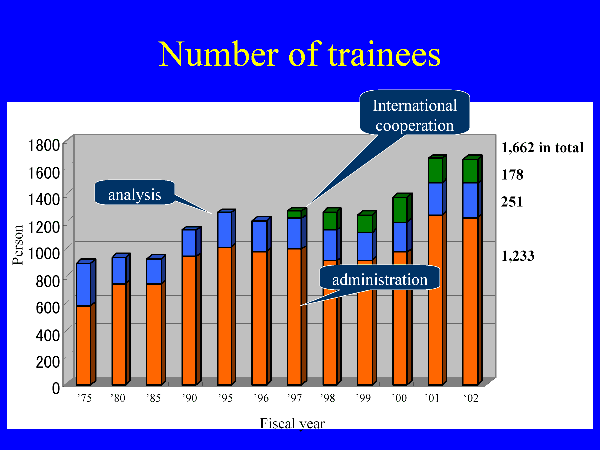Basic Policy for Training
Our nation's environmental problems have evolved dramatically over time.
It is inevitable that both national and local public organization should improve the quality and ability of their officials in environmental administration so that they can keep up with the trend related to the environmental issues and promote administration effectively.
The National Environmental Research and Training Institute is carrying out training aimed at the following fundamental policies.
- 1. To help trainees acquire the professional expertise and skills necessary to carry out their assigned tasks.
- 2. To broaden trainees' administrative perspeotive through an understanding of the situation surronding environmental issues and their relationships with relevant governmental programs, etc.
- 3. To develop administrative insight of trainees through an understanding of the role of environmental management in contributing to public welfare, etc.
- 4. To foster solidarity among trainees as environmental administrative staff and promote mutual enlightenment through a live-in training.
Overview of Training
The NETI offers courses in the four categories:
1. AdminiStration Training
Targeting environmental administrators in national and local government organizations, these courses are primarily comprised of lectures and studies of administrative cases. For the lecture portions, we invite a wide variety of speakers from universities, local authorities, industries, NPOs, NGOs and national government branches such as the Ministry of the Environment to share their specialized knowledge in the environmental field, explain the legal system and introduce the latest environmental operations underway. The environmental case studies serve to improveparticipants' problem-solving skills through debates on administration issues and cases of environmental problems in various local government branches. They also play an extremely important role in sharing information among environment-related departments across the country.
The contents of these courses reflect up-to-date topics of importance in environmental administration, and the programs are revised as needed in line with changes in environmental laws. Numerous problems involving waste products and recycling have emerged in recent years. In view of legislative efforts to establish a recycling-based society to counter these problems, we offer studies in systematic waste products and recycling.
2. International Cooperation Training
In order to respond to the latest administrative issues of global environmental problems, global warming countermeasures and international environmental cooperations, the training of administrators working in these areas is imperative. Designed primarily for national and local government workers, these courses offer international-related training in the following three fields:
Expertise necessary for global environmental preservation administration and global warming countermeasures.
Expertise necessary for hosting researchers from developing nations in order to share technology in the environmental field.
To train experts to be dispatched for international environmental cooperation.
In recent years, there has been a drastic increase in requests from developing countries asking Japan to send over environmental experts Personnel who have worked many years in the environmental field in national and local government organizations, with a high degree of skill and experience, can play an important role in international cooperations as well. In view of this, we offer various levels of type iii courses to systematically train international environmental cooperation experts.
3. Laboratory Analysis Training
Designed for national and local government workers in charge of environmental analysls, these courses are comprised of practical analysls training, lectures (trends in envlronmental monitoring and analysis technology), and seminars.
Participants study the environmental mediums of the atmosphere, water and soil in this course. By categorically researching dioxins, endocrine-disrupting chemicals (environmental hormones), and waste products, participants are taught analysis and measurement expertise, skills, and operation methods of measuring instruments. In particular, the Dioxin Monitoring program is divided into basic and advanced courses, in order to meet various levels of training needs.
Special analysis training courses are also available for individual participants, in order to educate leading engineers involved in analytical measurements at local government organizations.
4. Staff Training
Designed for people engaged in work at the Ministry of the Environment, these courses offer training that focuses on matters relating to carrying out duties by job type and position.
China/ Korea/Japan Tripartite Joint Environmental Training
  The Chinese, Korean and Japanese Ministers for the Environment agreed to improve their joint efforts on environmental issues at the China/Korea/Japan Tripartite Ministers for the Environment Meeting:TEMM), held in January 1999. Beginning in fiscal 2001 , joint training for civil servants in each country whose duties involve environmental administration is held in each country on a rotational basis. NETI implements this training in Japan, handling such responsibilities as the program's liaisons, coordination, and operations.
